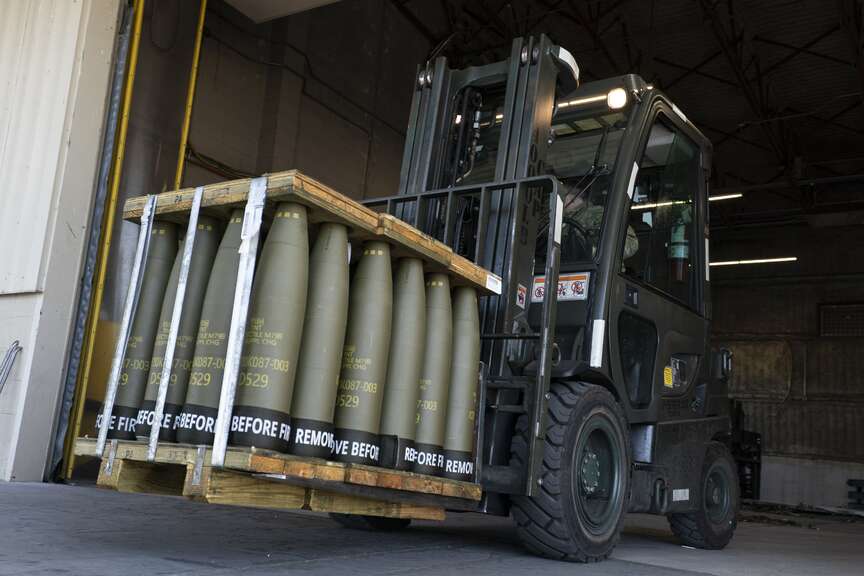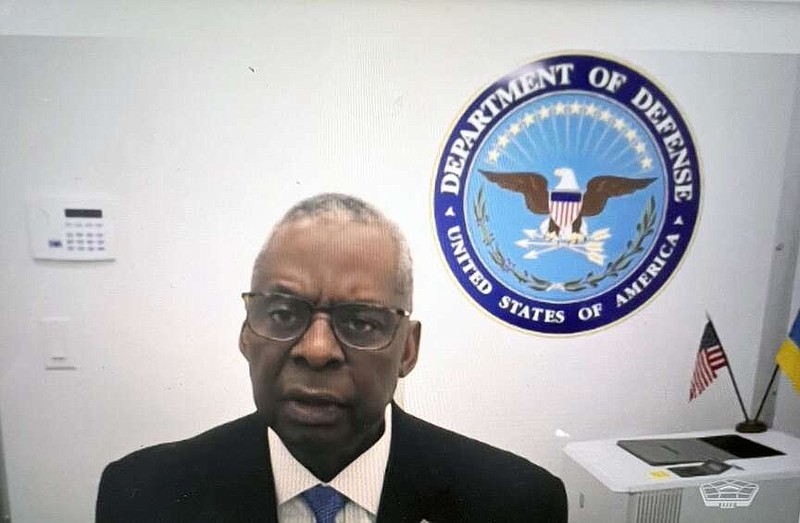WASHINGTON -- The United States is out of money for Ukraine, unable to send the ammunition and missiles that the government in Kyiv needs to fend off Russia's invasion.
With the aid caught up in domestic politics, the Biden administration on Tuesday came up empty-handed for the first time as host of the monthly meeting of about 50 nations that coordinate support for Ukraine. The group was established by Defense Secretary Lloyd Austin in April 2022.
While waiting for Congress to approve more money for Ukraine's fight, Washington will look to allies to keep bridging the gap.
"I urge this group to dig deep to provide Ukraine with more lifesaving ground-based air defense systems and interceptors," Austin said in opening remarks broadcast from his home, where he is recuperating after prostate cancer surgery.
The opening statement by video was the first recent public appearance from Austin, 70, who appeared slightly gaunt. He was hospitalized for two weeks after complications from the surgery.
After the meeting, Celeste Wallander, assistant defense secretary for international affairs, told reporters that Ukraine's ministry of defense is getting reports from its front lines that "units do not have the stocks and the stores of ammunition that they require."
Wallander added, "That is one of the reasons we have been focusing on the need to answer Congress' questions, so that they are able to move forward on a decision to pass" legislation with the aid.
The Pentagon announced its last security assistance for Ukraine on Dec. 27, a $250 million package that included 155mm artillery rounds, Stinger anti-aircraft missiles and other high-demand items drawn from existing U.S. stockpiles.
The U.S. has not been able to provide additional munitions since then because the money for replenishing those stockpiles has run out and Congress has yet to approve more funds.
More than $110 billion in aid for both Ukraine and Israel is stalled over disagreements between Congress and the White House over other policy priorities, including additional security for the U.S.-Mexico border.
Senators are trying for a bipartisan deal that would include nearly $61 billion in aid for Ukraine and make changes in border policy. But Republicans are renewing a push to scale back the amount of assistance for Ukraine, targeting money that would go to Ukraine's civil sector and arguing that European nations could step in to fund those needs.
"Personally speaking, I'd like to see portions pared down," Sen. John Thune of South Dakota, the second-ranking Republican senator, told reporters Tuesday. "I think the number is really high and there are a lot of things funded in there."
But even if a deal can be reached in the Senate, the package faces even more opposition in the House, where many Republicans have voted repeatedly against the Ukrainian war effort.
The U.S. has provided Ukraine more than $44.2 billion in security assistance since Russia invaded in February 2022. About $23.6 billion of that was pulled from existing military stockpiles and almost $19 billion was sent in the form of longer-term military contracts for items that will take months to procure. So even though funds have run out, some previously purchased weapons will continue to flow in. An additional $1.7 billion has been provided by the U.S. State Department in the form of foreign military financing.
In south Arkansas, some of the country's top defense contractors such as RTX, Lockheed Martin and Aerojet Rocketdyne have facilities for manufacturing advanced weaponry for the U.S. military. Notably, the MGM-140 Army Tactical Missile System, known as the ATACMS, is manufactured by Lockheed Martin at the defense contractor's factory in Camden. While the system was first developed in the early 1980s, Lockheed Martin delivered its first ATACMS missiles to the U.S. Army in August 2017, according to a company news release.
The $1.641 billion designated for defense contractors in Arkansas as part of the Ukraine Security Assistance Initiative makes the state the highest per-capita recipient of money related to the nation's support for Ukraine's war effort, according to a Department of Defense report released in November. Arkansas has also received $703 million in supplemental funds invested to improve government- and contractor-owned industrial base production capacity, the most of any state. An Aerojet Rocketdyne spokesperson said its workforce in Camden has increased by more than 80% over the past seven years, to more than 1,100 employees and is still growing. The company has sourced more than $215 million to Arkansas suppliers since 2016 and worked with more than 140 state businesses.
The U.S. and approximately 30 international partners are also continuing to train Ukrainian forces, and to date have trained a total of 118,000 Ukrainians at locations around the world, said Col. Marty O'Donnell, spokesman for U.S. Army Europe and Africa.
The United States has trained approximately 18,000 of those fighters, including approximately 16,300 soldiers in Germany. About 1,500 additional fighters are currently going through training.
Information for this article was contributed by Tara Copp, Lolita C. Baldor and Stephen Groves of The Associated Press and by Aaron Gettinger and Neal Earley of The Arkansas Democrat-Gazette.
 FILE - Airmen with the 436th Aerial Port Squadron use a forklift to move 155 mm shells ultimately bound for Ukraine, April 29, 2022, at Dover Air Force Base, Del. For almost 20 months the Pentagon has spearheaded a monthly gathering of about 50 allies where the U.S. has led the way in sending billions of dollars in aid to Kyiv. But on Jan. 23, 2024, for the first time since Secretary of Defense Lloyd Austin established the group in April of 2022, the U.S. will come to the table out of money, unable to send Ukraine the ammunition and missiles it needs to fend off Russia. (AP Photo/Alex Brandon, File)
FILE - Airmen with the 436th Aerial Port Squadron use a forklift to move 155 mm shells ultimately bound for Ukraine, April 29, 2022, at Dover Air Force Base, Del. For almost 20 months the Pentagon has spearheaded a monthly gathering of about 50 allies where the U.S. has led the way in sending billions of dollars in aid to Kyiv. But on Jan. 23, 2024, for the first time since Secretary of Defense Lloyd Austin established the group in April of 2022, the U.S. will come to the table out of money, unable to send Ukraine the ammunition and missiles it needs to fend off Russia. (AP Photo/Alex Brandon, File)